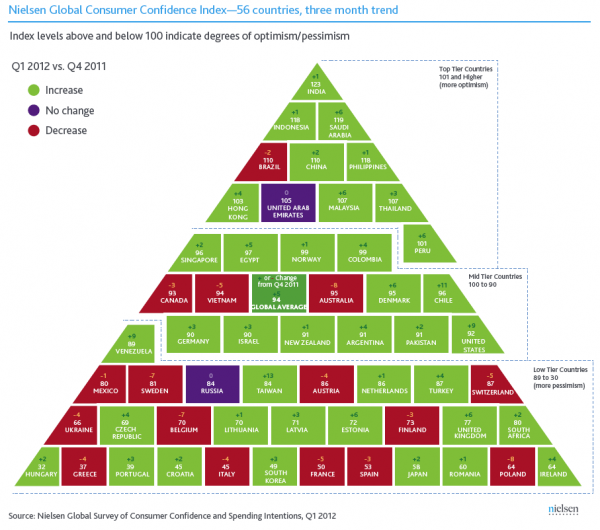UAE’ consumer confidence index remained unchanged at 105, above the average
Households around the globe experienced a brighter personal situation in terms of jobs and personal finances
Global consumer confidence increased five index points to 94 in Q1 2012, according to the latest online survey findings from Nielsen. Overall confidence rose in 68 percent of global markets measured, compared to Q4 2011 where confidence increased in 21 percent of global markets. Confidence in Q1 2012 increased in 38 out of 56 markets, fell in 16 markets and remained flat in two.
The United Arab Emirates consumer confidence index remained unchanged at 105 points, which is well above the average of 94 points.
“Households around the globe experienced a brighter personal situation in terms of jobs and personal finances last quarter, especially in the U.S. and in Asia, which was reflected in the improved consumer confidence and higher discretionary spending,” said Dr. Venkatesh Bala, chief economist at The Cambridge Group, a part of Nielsen. “While global economic conditions are more stable than in the depths of the European sovereign debt crisis late last year, underlying economic conditions are still fragile and fluid in many parts of the world, which could affect consumer confidence and spending momentum for the coming quarter.”
The Nielsen Global Survey of Consumer Confidence and Spending Intentions, established in 2005, tracks consumer confidence, major concerns and spending intentions among more than 28,000 Internet consumers in 56 countries. Consumer confidence levels above and below a baseline of 100 indicate degrees of optimism and pessimism.
Consistent good news outweighed the bad
In Nielsen’s Q1 survey, while more than half (57%) of consumers around the world indicated they were in a recession, that sentiment was down from 64 percent last quarter. Regionally, online respondents who believed they were in a recession showed declines in Asia-Pacific (44% compared to 53% in Q4), North America (80% compared to 86% in Q4) and Europe (72% compared to 74% in Q4), while a slightly growing number of online respondents in Latin America (48% compared to 47% in Q4) and Middle East/Africa (75% compared to 74% in Q4) believed they were in a recession.
Intended discretionary spending and saving increased in Q1 across all sectors reviewed. Half of consumers around the world plan to put spare cash into savings, up from 48 percent in Q4 2011. Thirty four percent intend to buy new clothes, up from 31 percent the previous quarter and 33 percent expect to spend spare cash on holidays and vacations—a rise of seven percentage points from Q4 2011. Planned spending on technology also increased, with 28 percent of global online consumers intending a purchase, up from 22 percent the previous quarter.
“Improved confidence led to more discretionary spending from consumers around the world in the past quarter,” said Dr. Bala. “The survey evidence suggests that while consumers are neither as confident nor comfortable with the economy as they would like it to be, they are expressing a pent-up demand to spend as they did prior to the recession. Such a desire for psychological release through the various forms of discretionary consumption reported in the Nielsen survey—all of which act as stress-relievers—is understandable after three years of relentless belt-tightening and uncertainty.”
Other notable findings of the online survey include:
- Concern for the economy remained a top worry among 19 percent of global respondents
- Confidence increased in 16 of 27 European markets
- U.S. consumer confidence index increased 9 points to 92
- China confidence increased 2 points to 110



































